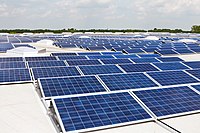
Photo from wikipedia
Abstract Solar energy utilization by rural households in Poland contributes to the EU-mandated increase in renewable energy use, while lowering emission, dependence on fossil fuels, and energy costs, and improving… Click to show full abstract
Abstract Solar energy utilization by rural households in Poland contributes to the EU-mandated increase in renewable energy use, while lowering emission, dependence on fossil fuels, and energy costs, and improving air quality. Using the survey data collected from owners of passive solar panels in rural areas, this study examines the importance of selected reasons in household decision to participate in the EU-funded solar panel subsidy program augmented by contributions from local governments and each household. Associations between nine reasons to invest in a solar panel and characteristics of respondents, their households, and solar panel features were examined using correlation coefficients. An ordered logit technique was also applied and calculations based on estimation results yielded probability changes in the relative importance attached to a selected reason for investing in a panel in response to a change in a respondent, household, or solar panel characteristic. The desire to save on energy used to heat space or water, and lower the energy bill as well as being unemployed or having part-time employment increased the probability of viewing the total cost, installation cost, subsidy, and the energy costs prior to having a solar panel as important. Those viewing the solar energy favorably were, overall, less likely to consider lowering the energy bill prior to putting a solar panel as important, while those perceiving solar panel features as troublesome were also less likely to view the listed reasons as important.
Journal Title: Resources, Conservation and Recycling
Year Published: 2018
Link to full text (if available)
Share on Social Media: Sign Up to like & get
recommendations!